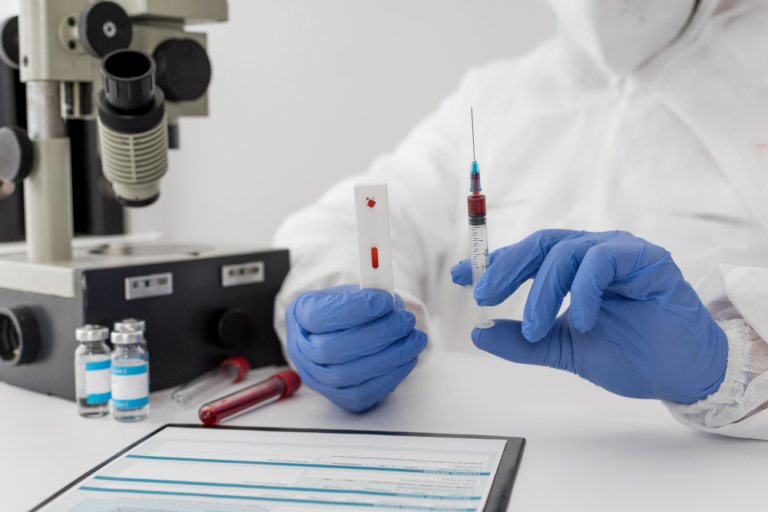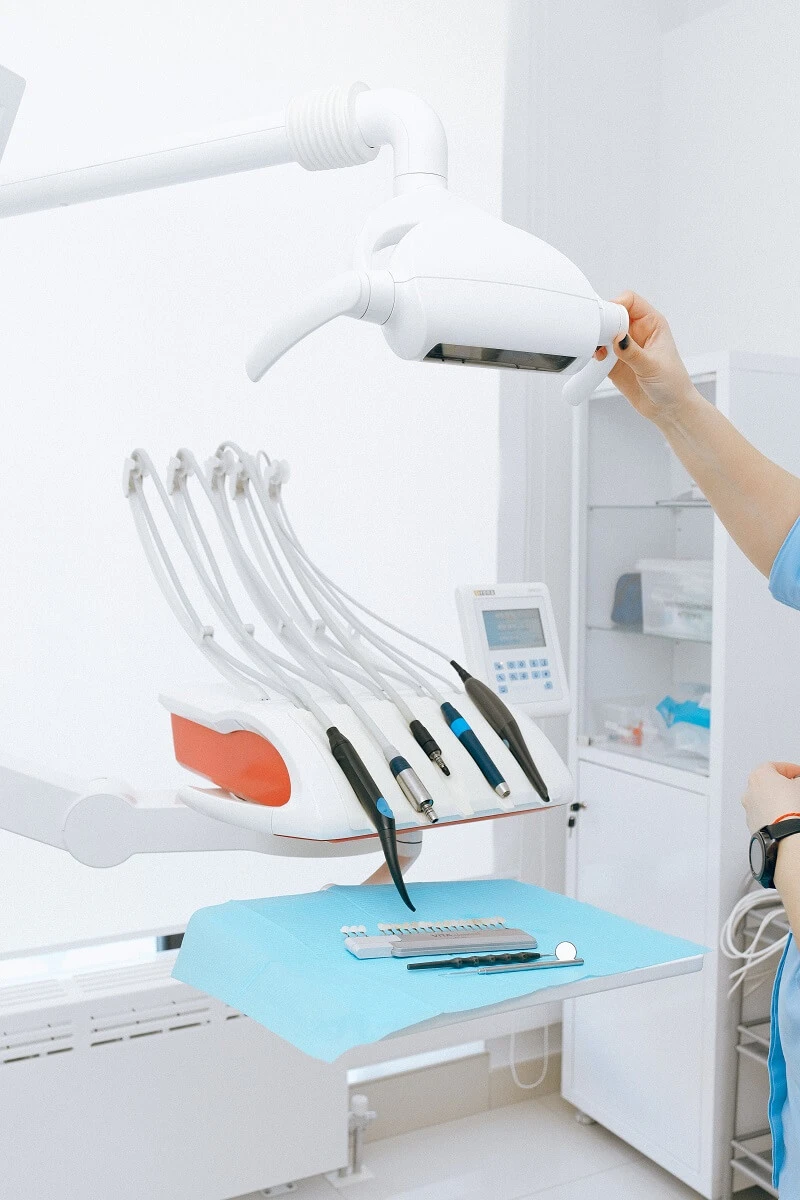- clinic@fpmedicalcenter.com
Triple Marker Test in Dubai
What is a Triple Marker Test?
A Triple Marker Test is a specific test of blood which is performed during pregnancy. The test measures the concentration of three vital chemicals present in her blood, namely alpha-fetoprotein (AFP), human chorionic gonadotropin (hCG), and estriol. These biochemical markers are used to assess the risk of chromosomal abnormalities as well as neural tube defect in the fetuses that are undergoing formation inside the mother’s womb.
It was utilized during the regular prenatal visit with the aid of one screening test to screen on the level risk of bearing offspring with birth abnormalities. It’s not capable of making any specific diagnosis, although it would really help the examiner determine a woman’s degree of risk. Patients are therefore transferred to have their risk confirmed on amniocentesis or NIPT testing if at confirmed high risks level.

Major Things Involved in the Test
Alpha-fetoprotein is also referred to as AFP, meaning a fetus protein whose maternal blood circulation normally takes place. In some cases, the higher or lower-level AFP during pregnancy results in a neural tube defect or chromosomal abnormality.
hCG stands for Human Chorionic Gonadotropin, which refers to a hormone of the placenta; changes in the count of this hormone raise the likelihood of developing the Down syndrome or Edwards syndrome and so on.
Estriol is the estrogen produced by the fetus as well as the placenta. Levels of estriol show how well the baby is doing as well as how well the placenta is working.
Why You Need a Triple Marker Test?
The Triple Marker Test is another important instrument in the process of prenatal care because it gives much-needed light on health issues related to the fetus. This test detects Down syndrome, also referred to as Trisomy 21, Edwards syndrome or Trisomy 18; and neural tube defects such as spina bifida. The conditions may greatly affect the baby’s health; therefore, early detection would become a precursor to good decision-making at the right time.
Upon a report from a test, after confirmation that this child has increased risk of showing abnormalities, more testing is directed at the pregnancy for the involved physician to anticipate or prepare, have better arms when challenges present, or, depending on situations arising, guide in decisions pertinent to the delivery or continuation.
Triple Marker Testing-When it is Done
It can be done at any time between the 15th and 20th weeks of gestation. However, results are obtained when the test falls in the range from the 16th to the 18th weeks. This is because the optimum levels of biochemical markers are achieved during this period.
Since the test is just a simple blood draw, there is no risk to the mother or the baby. This is a non-invasive procedure and would generally be done as part of routine prenatal care for women who may be at an increased risk of fetal abnormalities.
Triple Marker Test Purpose
The triple marker test is the most basic purpose in screening for chromosomal abnormalities. It most commonly results in revealing Down syndrome, or what is popularly referred to as Trisomy 21, a genetic condition that interferes with developmental capabilities for both intellective and somatic development. In addition to Down syndrome, it can also detect Edwards syndrome, or Trisomy 18, where more significant chromosomal malformations are to be expected clinically, with multiple congenital anomalies and does not survive for so long.
It is associated with chromosomal abnormalities; the neural tube defect that spina bifida also indicates. The type of anomaly where the wrong development of spine and spinal cord results in a lifetime disability occurs.
This test also has the other role of testing the well-being of the fetus. It does not give any form of diagnosis but makes the doctor decide if further test is required in an effort to deliver a healthy pregnancy.
Why is the Triple Marker Test Needed in Pregnancy?
This test is highly recommended to a group of women who may be at risk of having a baby with genetic disease. It is recommended to women over 35 years because the maternal age is the single most determinant factor for chromosomal abnormalities.
This also aids in the evaluation of women with a family history of genetic conditions or those who have had prior pregnancies with chromosomal abnormalities. In many cases, women are recommended to have this test conducted on them if earlier scans indicated abnormal results, including the nuchal translucency (NT) scan.
Moreover, women who have been exposed to noxious agents in pregnancy include radiation, infection, or any other medication are advised to undergo the test to ascertain the safety of health in the fetus.
Advantages of Early Detection
This will allow doctors and parents to make the right decisions regarding the pregnancy once chromosomal abnormalities or neural tube defects have been diagnosed earlier. Once knowledge of such risk factors is gathered in advance, one can strategize for all the right kinds of medical intervention, lifestyle change, and even necessary prenatal care to be at their benefit for the mom and the child.
Where the test results show a major risk, then genetic counseling will be able to provide them with the support needed. To parents, it would prepare them well for the arrival of their special needs baby, and at least some options may be found about the available treatment.
Pre-testing precautions on the triple marker test
There are no special dietary restrictions or preparations to be made before undergoing the Triple Marker Test. Pregnant women can eat and drink normally before the test because fasting is not required.
However, the patient should also mention any medication or supplement she is taking because some may interfere with the test results. The patient’s history of illnesses and pregnancies should be also as accurate to allow one to make interpretations of the findings.
How to Prepare for Triple Marker Test in Pregnancy?
The test preps are quite easy. Women are advised to be as stress-free as possible and drink plenty of water when preparing to take the test. For as long as the blood test is a usual one, no special diet or preparation need be taken on the body. Blood is usually drawn from the arm and sent to the laboratory for testing.
How Is the Triple Marker Test Administered?
The Triple Marker Test procedure is relatively straightforward. A small sample of blood is drawn from the mother’s arm and sent to the laboratory for analysis. In this instance, the level of AFP, hCG, and Estriol in comparison with some standard reference values is evaluated.
The results are scored according to a number of factors that include maternal age, weight, ethnicity, and gestational age. All these factors will be helpful in determining the level of risk associated with genetic disorders or neural tube defects.
What Do Triple Marker Test Results Mean?
A normal test result means that the risk of chromosomal abnormalities and neural tube defects is lower. However, a normal result does not mean that the baby is free of genetic conditions.
If the results are abnormal, then further diagnostic tests such as amniocentesis, CVS, or advanced ultrasounds may be recommended to confirm the findings.
Abnormal Test Results
It has a higher AFP level associated with spina bifida-like neural tube defects. Low values of AFP together with an abnormal level of hCG and Estriol may suggest the presence of Down syndrome or Edwards syndrome. HCG elevation may also be an indication of multiple pregnancy.
Reliability of the Triple Marker Test
The Triple Marker Test is a reliable screening tool but not 100% diagnostic. It helps in assessing the level of risk but does not confirm genetic conditions. If the results suggest an increased risk, additional confirmatory tests are recommended.
You can now book a triple marker test in Dubai from First Priority Medical Center by contacting its professionals to be guided accordingly by the experts!
FAQs
It tests the risk of genetic disorders as well as the neural tube defect in the infant.
It is not a necessity but is always a recommended test so that early knowledge about the possibility of the risk factor’s detection can be known.
No. It is very essential post NT scan, though it is not really required.
If in case the NT scan turns out to be abnormal, Triple Marker Test is primarily recommended further for assessment.
Negative results mean the risk of genetic disorder is lesser and therefore the anxiety level decreases.
A normal test result indicates the pregnancy levels of AFP, hCG, and Estriol at the expected level.
A normal range may differ with gestational age, maternal weight, and ethnicity. Your physician will interpret your particular results.
The Triple Marker Test provides more information than in a Dual Marker Test. This, therefore makes it wider.
Women above the age of 35 years are more exposed to genetic effects. Therefore, this test is very essential to them.
Positive result means more risk, but it is not a confirmed diagnosis. Sometimes, doctors will have to perform other tests, such as amniocentesis.
It is a reliable screening test but does not provide an absolute diagnosis.
Scheduling
Arrival
Testing
Waiting
Result
Benefits of Pregnancy Test at First Priority Medical Center
01
Skilled and Experienced Medical Professionals
We have Expert Doctors with more than 22 Years of experience.

02
Advanced Technology
We have Technology available at our Clinic. State of the art Equipment’s and skilled professionals.

03
Focused Approach
We focus on your needs and prioritize your comfort and satisfaction. So that your experience with us is excellent.

04
Confidentiality
We prioritize your privacy. Our testing process is discreet and confidential

05
Personalized Plan
Our plans are personalised to your specific needs and concern.
Pregnancy Test Process
Scheduling Appointment: By scheduling an appointment at First Priority Medical Center Dubai testing center. You can do this by phone or through Whatsapp.
Reach the Clinic: On the time of your appointment, reach the clinic. Our friendly staff will greet you and guide you through the process. If you have any questions feel free to ask them.
Testing Process: The testing process is quick and straight forward. Our staff will explain all steps to you and ensure your comfort, A urine sample is usually required for the test.
Waiting: Depending on the test, you might receive your results within minutes or, in some cases, a little longer. Rest assured, our facility is designed to make your wait as comfortable as possible.
Results: Once your result is ready, our staff will provide you with the information you have been waiting for. Regardless of the outcome, our team is here to support you.

How to prepare for Pregnancy Test
Hydration: Drink water before your appointment, Staying hydrated can make the testing process smoother.
Timing: It’s advisable to take the test a few days after you’ve missed your period for the most accurate results.
Comfort: Wear comfortable clothing during your appointment to help you feel at ease during the testing process.
Quick Contacts
- Phone : +971 50 395 3762
- Email : clinic@fpmedicalcenter.com
- 303, Al Wasl Building, In front of Dubai Mall & Burj Khalifa Metro Station, Dubai
- Country : UAE
- Copyright 2024 - First Priority Medical Center - All Rights Reserved.

